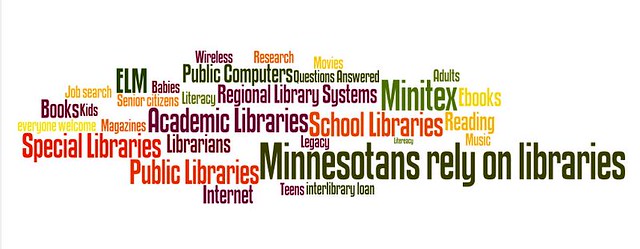Please keep in mind that is a draft--we know it is incomplete in various sections. We wanted to get something started in time for this Legislative Day. We will continue to make progress. Please share your comments & ideas with mscott@selco.info.
This site is intended to assist both newcomers and old hands advocate for Minnesota libraries of all types. The hope is to provide a one-stop spot for information about what is going on in the current legislative session, an overview of how Minnesota libraries and systems work together to meet the needs of all Minnesotans, how to participate in Library Legislative Day, and an "Advocacy 101" introduction to those who may be new to advocacy.
Use the tabs to navigate to the section you want to view.
This site is intended to assist both newcomers and old hands advocate for Minnesota libraries of all types. The hope is to provide a one-stop spot for information about what is going on in the current legislative session, an overview of how Minnesota libraries and systems work together to meet the needs of all Minnesotans, how to participate in Library Legislative Day, and an "Advocacy 101" introduction to those who may be new to advocacy.
Use the tabs to navigate to the section you want to view.
- Legislative Updates are provided by the MLA/MEMO lobbyist to keep everyone up-t-date on legislative activities that impact libraries.
- Library Legislative Day explains the purpose of the Day & offers hints on how to make the most of the day.
- Advocacy 101 offers an overview of advocacy, especially as it relates to libraries.
- Minnesota Legislature 101 explains how the Legislature is structured and the Committees libraries need to know.
- Grassroots Advocacy offers ideas on how best to contact your legislator, letter writing & visit tips, & more.
- About MN Libraries explains how libraries and library systems are organized and funded. This will hope people understand what is funded at the state or local level, what elements of library budgets rely on state support, and a list of library acronyms.

